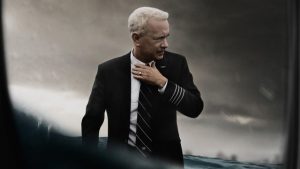Sully
Starring: Tom Hanks, Aaron Eckhart, Laura Linney
Directed by Clint Eastwood
Written by Todd Komarnicki
Review: Michael Dalton
[rating: 2/5]
What has happened to Clint Eastwood? In recent years with films like the lazy American Sniper and the repellent Jersey Boys, it would seem he’s lost faith in us. He doesn’t trust us to meditate or analyse. Now, he takes us by the hand like a dutiful guide. A big part of the appeal of his films was how style free they were, and that in itself became his style, his trademark. In films such as Changeling, Million Dollar Baby, and the magnificent Letters from Iwo Jima, he proved how adept he was at getting to the heart of the story and flourishes, the overblown, overacted, over-everything Mystic River withstanding, didn’t seem to be part of his arsenal. He effortlessly tapped us into the heart of the matter, examined the contentions of the tale, and ushered us on. We were touched and moved in a way that felt neither manipulative nor condescending.
His latest film Sully is a disappointment. With Tom Hanks, Aaron Eckhart, and Laura Linney in the key roles, the heart and soul of this true story about airline pilot Captain Chesley “Sully” Sullenberger have been completely dispensed with. On January 15 in 2009 when US Airways Flight 1549, carrying 155 passengers and crew, hit a flock of Canada Geese (the aviation term is a “bird strike”) which resulted in the crippling of both engines, Sully, with no airport in comfortable range, landed the craft in the freezing cold Hudson River. It must have been the most horrifying 208 seconds for those on board and remarkably, everyone survived. The film is framed with an investigation into what took place up there and why Sully made such an off-the-wall decision while outside the closed doors inquiry, New York en masse was waiting to shake his hand.
Now commonly referred to as “Miracle on the Hudson”, and indeed it was, the landing itself is a visual treat. We see it twice throughout the course of this surprisingly small film (at 96 minutes it is the director’s shortest film) and it is breathtaking. We feel it, the adrenalin and the fear, and as Hanks demonstrated in his previous real life drama, the infinitely superior Captain Phillips, he is a champion at drawing us into the action. Silver haired and earnest, Hanks portrays Sully with quiet dignity (the role’s a perfect fit), determined to let the world know he’s not a hero but a man doing his job (the public reception overwhelmed him), and that the happy outcome was the result of an ensemble effort. It’s a performance best termed serviceable and it matches the character. He’s haunted by nightmares and quiet guilt over whether he could’ve made it to the airport and the fodder is right there for some kind of internal conflict but it never comes. You’ll smile when the investigators, initially portrayed as hierarchical villains seemingly out to wreck his heroic reputation, get their comeuppance when, after a room full of officials watch two separate flight simulations, Sully points out the flaw in their reasoning; its one of those scenes Eastwood is famous for: knifing the administration. There are unnecessary flashback scenes to Sully’s younger years in the cockpit that lend nothing to the business at hand and his nocturnal jog around the city seems like filler. Throughout the investigation, he talks to his wife Lorraine constantly on the phone (they never share the screen, she’s at home waiting for him) and the intensity we expect from these conversations never comes either. Linney, and never has she been so wasted, clasps the phone dramatically, complains about the media camped outside her door, and quietly weeps. With a push-broom moustache, Eckhart, as Sully’s co-pilot Jeff Skiles, nods appreciatively and then nods some more.
Why did Eastwood take this story on? Beyond the event itself, there’s nothing here that could answer that question. Perhaps he was hoping to find it in the editing room. It must have been a frustrating search.




